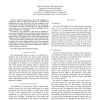Free Online Productivity Tools
i2Speak
i2Symbol
i2OCR
iTex2Img
iWeb2Print
iWeb2Shot
i2Type
iPdf2Split
iPdf2Merge
i2Bopomofo
i2Arabic
i2Style
i2Image
i2PDF
iLatex2Rtf
Sci2ools
HRI
2010
ACM
2010
ACM
Mysterious machines
—Alan Turing proposed a test for the intelligence of machines in 1950 [1]. Despite great efforts, no computer has passed this test so far. Each year, chat bots compete for the Loebner Prize, the first formal instantiation of a Turing Test. No contender was able to fool the jury yet. Major problems of the chat bots are the lack of common knowledge and the logical consistency of a dialogue. We explore a new approach to chat bots by focusing on non-logical conversation topics: mysticism. The founding books of the major religions are widely acknowledged examples of mystical topics. We selected the New Testament, the Koran and Rigveda as the knowledge base for our conversational robots. The robots are able to autonomously talk to each other and to humans about their religious believe. Each robot represents a belief, but we do not reveal their convictions. This ambiguity forces observers to follow the actual conversations instead of quickly applying stereotypes. Keywords-turing;chatbot;ex...
| Added | 03 Jul 2010 |
| Updated | 03 Jul 2010 |
| Type | Conference |
| Year | 2010 |
| Where | HRI |
| Authors | Billy Schonenberg, Christoph Bartneck |
Comments (0)

